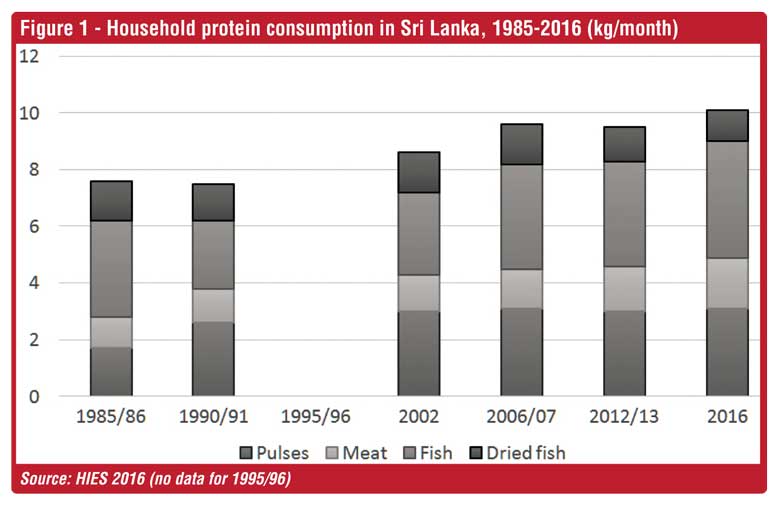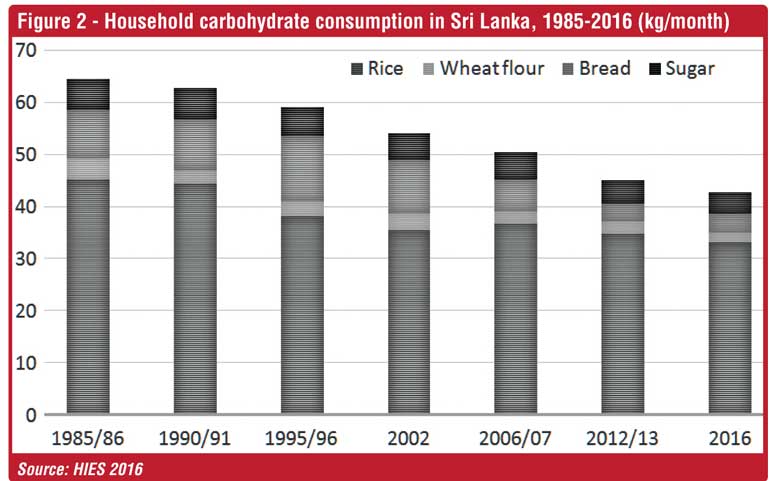Friday Mar 14, 2025
Friday Mar 14, 2025
Thursday, 22 February 2018 00:00 - - {{hitsCtrl.values.hits}}


“People are the real wealth of a nation. The basic objective of development is to create an enabling environment for people to enjoy long, healthy and creative lives. This may appear to be a simple truth. But it is often forgotten in the immediate concern with the accumulation of commodities and financial wealth.”
The purpose of politics is the betterment of the lives of the people as stated above by the late Pakistani Economist Mahbubul Huq. This purpose is not well served by spending an entire week finding an answer to the question of how the Prime Minister could be replaced. But now that our tail-chasing politicians have finally found the relevant page in the Constitution, we should do our bit to refocus their minds on the real priorities.
It so happened that the final report of the 2016 Household Income and Expenditure Survey just came out. This is a very good use of taxpayer money. The problem is that most politicians and officials do not use the information it provides. For the most part, the media neglects to present the results in understandable form, choosing to wallow in political gossip and speculation instead. But let us try.
It has been said that Engel’s Law which states that the lower a family’s income, the greater is the proportion of it spent on food is one of the best established of all the empirical regularities observed in economic data.
From a high of 60.9% of total household expenditures spent on food in 1990-91, the food ratio has declined to 34.8% in 2016, the lowest it has ever been for Sri Lanka. What that means is that 65.2% of an average household’s expenditures are now devoted to things like housing, transport, education, healthcare, personal care, entertainment and so on. This is what a better life means, practically. We can be happy about how far we have come over the past decades in terms of improving the incomes of Sri Lankan households.
But averages are averages. In the estate sector only 51.5% of household expenditure is available for non-food items. Until we see the gap between our plantation workers and the urban dwellers narrow, we cannot be content.
As can be seen from Figure 1, protein consumption has been increasing over the years along with our prosperity. This is a corollary of Engel’s Law. As the wealth of households increases, people shift from carbohydrates to protein. Carbohydrate consumption has declined over the past decades, as shown by Figure 2.
It is a good thing that carbohydrate consumption, especially sugar consumption, is going down. The greatest health problems for Sri Lankans are non-communicable diseases such as diabetes and hypertension. Reduced rice, flour and sugar consumption is definitely a good thing. If the population is not growing as much as in the past and households are consuming less rice and sugar, should this not be factored into our agricultural policies and the land and resources now devoted to these products gradually diverted to other purposes?
Fish consumption is increasing and will continue to increase. Would it not make sense to allow the use of paddy lands for fish cultivation as it is being done in Bangladesh? As reported by the Economist, in 2016 Bangladesh’s farmers produced 2.2m tonnes of fish in inland fisheries on land that used to grow crops in the past. That is more than what was caught in the wild, and more than fish farmers produced in any other country except China, India, Indonesia and Vietnam. Bangladesh’s domestic farmed-fish industry has doubled in size since 2008 and is 19 times bigger than it was in 1984.
It’s not that the government of Bangladesh made this happen. The decentralised initiative of Bangladeshi entrepreneurs was responsible. The difference between the two countries is that we have laws stifling such initiative.
The 2018 Budget Speech included language suggesting that, finally, the Government of Sri Lanka was beginning to get the point. It stated that the Paddy Lands Act, No. 1 of 1958, and the Agricultural Lands Act, No. 42 of 1973, would be amended to allow the farming of alternative crops. Mention in the Budget is not enough. Research and consultation must be done and legislation drafted. This is the kind of work our government should be doing, not engaging in futile debate about how to subvert the provisions of the 19th Amendment.
Discover Kapruka, the leading online shopping platform in Sri Lanka, where you can conveniently send Gifts and Flowers to your loved ones for any event including Valentine ’s Day. Explore a wide range of popular Shopping Categories on Kapruka, including Toys, Groceries, Electronics, Birthday Cakes, Fruits, Chocolates, Flower Bouquets, Clothing, Watches, Lingerie, Gift Sets and Jewellery. Also if you’re interested in selling with Kapruka, Partner Central by Kapruka is the best solution to start with. Moreover, through Kapruka Global Shop, you can also enjoy the convenience of purchasing products from renowned platforms like Amazon and eBay and have them delivered to Sri Lanka.
Discover Kapruka, the leading online shopping platform in Sri Lanka, where you can conveniently send Gifts and Flowers to your loved ones for any event including Valentine ’s Day. Explore a wide range of popular Shopping Categories on Kapruka, including Toys, Groceries, Electronics, Birthday Cakes, Fruits, Chocolates, Flower Bouquets, Clothing, Watches, Lingerie, Gift Sets and Jewellery. Also if you’re interested in selling with Kapruka, Partner Central by Kapruka is the best solution to start with. Moreover, through Kapruka Global Shop, you can also enjoy the convenience of purchasing products from renowned platforms like Amazon and eBay and have them delivered to Sri Lanka.